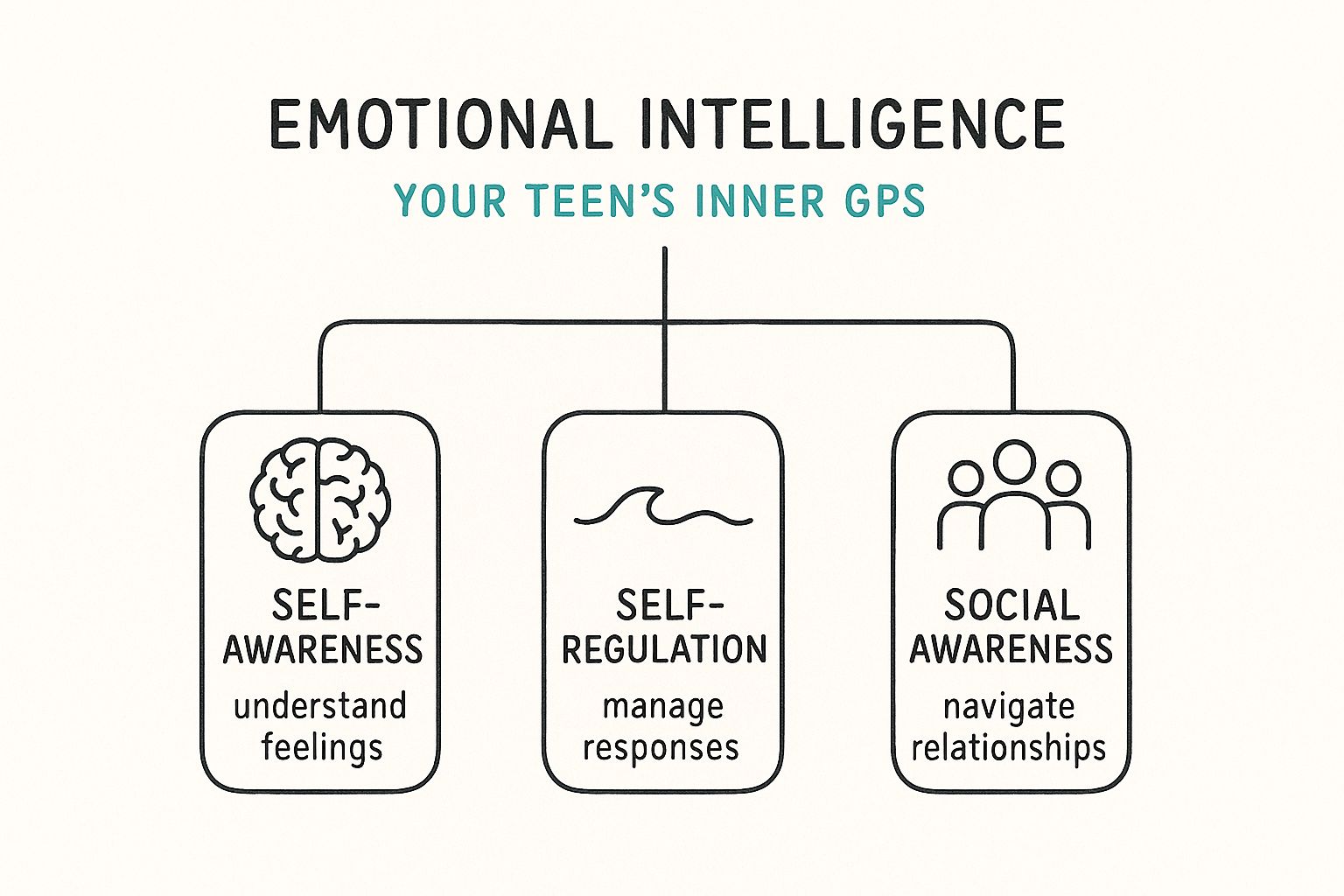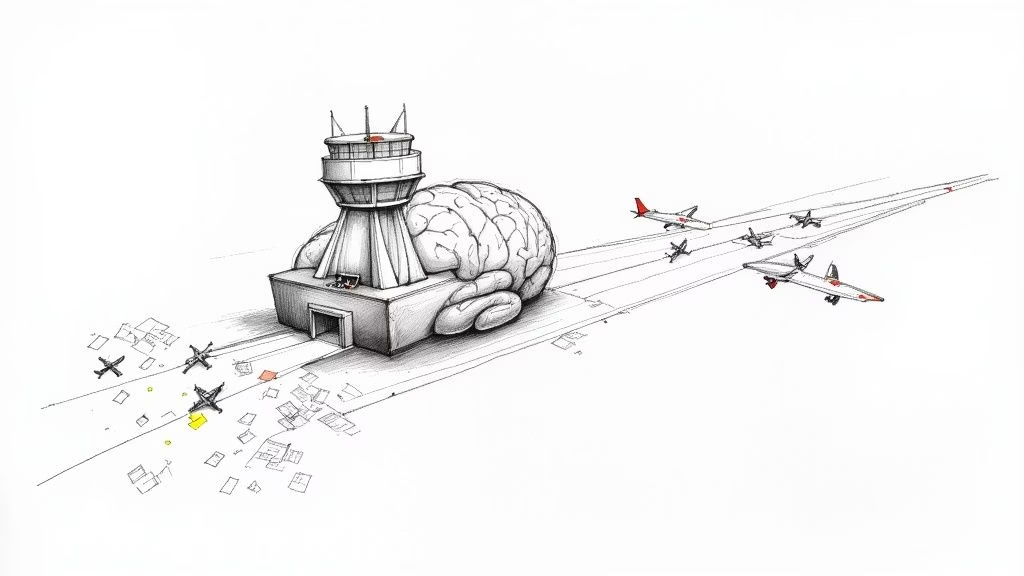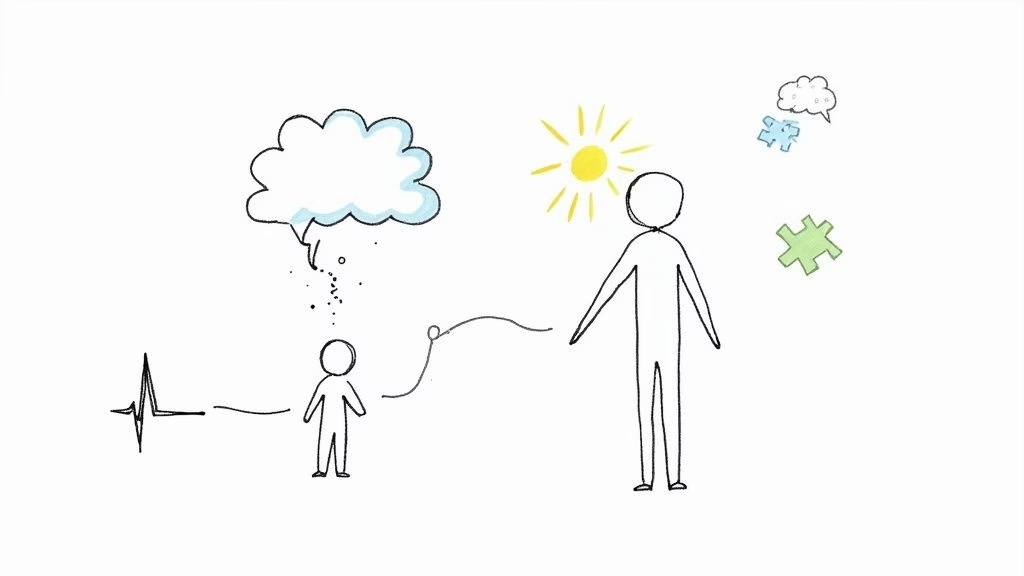Emotional intelligence is a teen's ability to get a handle on their own emotions while also understanding what makes other people tick. Think of it as an inner GPS for navigating the intense social scene and academic pressures that define these years. It’s the toolkit they need to build real resilience, strong friendships, and stay motivated when things get tough.
Why Emotional Intelligence Is Your Teen’s Superpower
The teenage years are a rollercoaster. There are high-stakes emotions, a brain that’s rapidly changing, and a social landscape that shifts by the day. For a lot of teens, the natural instinct is to shove down difficult feelings like anxiety, frustration, or sadness. They see them as weaknesses to be hidden away.
But what if they had another option? This is where emotional intelligence in adolescence becomes a game-changer.
Instead of fighting their feelings, teens learn to just notice them. This simple act of acknowledging an emotion without judgment is the first real step toward strength. It teaches them that feelings are just temporary signals, not who they are. That shift in perspective is the bedrock of resilience, giving them the power to handle setbacks without getting completely overwhelmed.
The Inner GPS for Teen Life
Emotional intelligence (EI) is like an internal guidance system. It helps teens read their own emotional dashboard ("Am I anxious because of this test, or because of that fight with my friend?") and steer through the complex world around them. With a well-calibrated inner GPS, they’re far better equipped to deal with academic pressure, stop procrastinating, and find their motivation.
This infographic breaks down what that "inner GPS" actually looks like.

As you can see, skills like self-awareness and self-regulation work together with social skills to create a complete emotional toolkit.
The Four Pillars of Emotional Intelligence for Teens
To make this more concrete, let's break down the core components of emotional intelligence into four key pillars. This framework helps show what these abstract concepts actually look like in a teenager's daily life.
| Pillar | What It Means for a Teen | A Real-Life Example |
|---|---|---|
| Self-Awareness | Knowing what you're feeling and why. It’s about tuning into your own emotional state without judgment. | After bombing a test, a teen recognizes they're not just "mad," but also disappointed in themselves and anxious about their grade. |
| Self-Management | The ability to control impulsive feelings and behaviors. It’s about responding thoughtfully instead of reacting instantly. | Instead of yelling at their parents during an argument, they take a deep breath and say, "I'm too frustrated to talk about this right now." |
| Social Awareness | Understanding the emotions and perspectives of others. This is the foundation of empathy and reading social cues. | They notice a friend is unusually quiet at lunch and ask, "Hey, you seem down today. Is everything okay?" |
| Relationship Management | The skill of building and maintaining healthy relationships. It involves clear communication, conflict resolution, and teamwork. | Two friends disagree on a group project. Instead of blaming each other, they work together to find a compromise that satisfies both. |
Mastering these four areas gives teens the practical skills they need not just to survive adolescence, but to truly thrive in it.
Adolescence is a critical window to build these skills, but it doesn't happen automatically. Globally, the prevalence of mental health disorders in adolescents is a staggering 13.4%, with anxiety and depression leading the charge. This number shines a light on the immense psychological stress teens are under, making emotional intelligence more vital than ever. You can explore more research on adolescent mental health and EI development.
A common myth is that strong teens don't feel bad. The truth is, emotionally intelligent teens feel everything—they just have better tools to understand and respond without letting their feelings run the show. They learn that just noticing an emotion can be a superpower. This is especially important for teen boys, who often face social pressure to bottle everything up. Resources like mens groups and mentorship can give them a space to build these essential skills.
How Emotional Skills Tackle Real Teen Challenges
It’s one thing to talk about emotional intelligence, but it’s another to see how it actually works in a teenager’s life. For them, these skills aren’t just abstract concepts. They’re practical tools for cutting through academic pressure, procrastination, and the minefield of social dynamics.
When a teen starts building their emotional toolkit, they gain a real advantage over the very hurdles causing them the most stress.
Take the classic teen struggle: procrastination. It’s easy to slap the "lazy" label on it. But looking at it through a lens of self-awareness reveals something deeper. A teen might realize their procrastination isn't laziness at all. It’s a fear of failure or anxiety about not living up to expectations.
This insight changes everything. Suddenly, they’re not fighting some vague "lack of motivation"—they’re facing a specific fear. This is where self-regulation comes in, giving them the tools to manage that fear instead of being paralyzed by it. Emotional skills are what teens need to navigate the very real challenges they face, including many actionable problems to be solved for kids that impact their mental health.
From Procrastination To Motivation
Once a teen can see fear is what’s holding them back, they can start taking small, manageable steps. Self-regulation might look like breaking a huge project into tiny tasks so it feels less overwhelming. Or it could be a simple mindfulness trick to calm their nerves before diving into homework.
It’s not about getting rid of the fear. It’s about learning to move forward with it.
This process creates a direct line between a teen’s emotional world and their ability to get things done. They learn that feelings aren't roadblocks to be pushed through, but signals to be understood.
A teen who can say, "I'm putting off this essay because I'm scared my teacher will think it's bad," has already won half the battle. Naming the emotion strips it of its power and turns an overwhelming problem into a solvable one.
Being able to manage their internal world translates directly into better focus and a feeling of control over their schoolwork and goals.
Navigating Friendships And Peer Pressure
Academics aside, emotional intelligence in adolescence is a social survival skill. Think about the daily drama of high school—fights with friends, social hierarchies, and the constant pull of peer pressure. A teen with low emotional awareness might react impulsively to a comment, blowing a small conflict into a full-blown friendship crisis.
But a teen with strong social awareness and relationship skills can navigate these situations with way more grace.
- Handling Disagreements: Instead of getting defensive, they can actually listen to their friend's side, explain their own feelings without attacking, and find a way to fix things.
- Resisting Peer Pressure: They’re more in tune with their own values, which gives them the confidence to say "no" to stuff that feels wrong, even if it makes them unpopular.
- Building Resilience: Social setbacks are going to happen. Emotionally intelligent teens are better equipped to process the sting of rejection or disappointment and bounce back without it crushing their self-worth.
These skills aren’t just about “being nice.” They’re about effective communication and self-preservation.
Unfortunately, while we know EQ is a powerful shield against mental health issues, many teens aren't developing these skills. A recent study found that 18% of adolescents had low emotional intelligence. That’s nearly one in five teens who lack the emotional toolkit to buffer themselves from mental health struggles, highlighting a critical gap. This just underscores how urgent it is for parents and educators to focus on this area of development.
A Parent’s Guide to Fostering Emotional Intelligence

As a parent, you have a huge opportunity to help your teen build emotional intelligence in adolescence. The real challenge? Doing it without sounding like you’re giving a lecture. It all comes down to creating a safe space where they feel heard and respected—that’s the real foundation for emotional growth.
This starts with a simple shift in how you talk to them. The classic, conversation-killing "How was school?" rarely gets you anywhere. Instead, try asking something that invites a real story, like, "What was one high point and one low point of your day?" Questions like that open the door to a real exchange about what’s actually going on in their world.
The goal here is validation. It's about acknowledging your teen's feelings as real and important, even when you don’t necessarily agree with their perspective. When a teen feels like their emotions are brushed aside, they learn to bury them. But when they feel seen, they learn how to process them.
Model the Behavior You Want to See
Your teen is watching you. They learn far more from what you do than from what you say. Modeling healthy emotional expression means showing them how you handle your own stuff—the good, the bad, and the frustrating. This isn't about being perfect; it's about being human and showing them constructive ways to cope.
There's nothing more powerful than a teen seeing a parent say, "I'm feeling really frustrated right now, so I'm going to take a few minutes to cool down before we continue this conversation." In that one sentence, you've just taught them self-awareness, self-regulation, and how to handle conflict with respect.
This simple act normalizes big emotions and proves that there are healthy ways to manage them. For parents juggling work and family, finding that balance is everything. If you're looking for ways to create a more harmonious home, check out these helpful tips for working from home with children.
From Procrastination to Understanding
When your teen is putting off a big project, your first instinct might be to lecture them about motivation or work ethic. But that moment is actually a golden opportunity to coach them on emotional intelligence. More often than not, procrastination is just a symptom of a deeper emotion, like anxiety or a fear of not being good enough.
Instead of focusing on the task, get curious about the feeling.
- Ask open-ended questions: "I notice you're having a tough time getting started on that essay. How are you feeling about it?"
- Validate their experience: "It's totally normal to feel overwhelmed by a big project. I've been there, too."
- Brainstorm solutions together: "What's one small thing we could do right now just to make it feel a little less huge?"
This approach changes the dynamic completely. You’re no longer in a battle over schoolwork; you're on the same team, exploring the emotions that are getting in the way. This is also where targeted support can make a huge difference. You can learn more about how a structured approach helps teens get past these roadblocks through emotional intelligence coaching.
Mindfulness and Resources for Struggling Teens
One of the most powerful life skills you can give your teen is mindfulness. The natural instinct for most of us—especially teens—is to run away from uncomfortable feelings. Mindfulness teaches them to do the opposite: to simply notice their emotions without judging them, to just feel them as temporary sensations that come and go.
You can introduce this with a simple meditation. It doesn't have to be complicated.
A 3-Minute Teen Meditation Guide
- Find a comfortable spot: Sit or lie down somewhere you won't be interrupted. Close your eyes if that feels right.
- Focus on your breath: Don't try to change it. Just notice the feeling of the air moving in and out of your body.
- Notice what you feel: Scan your body. Is there tightness in your chest? A knot in your stomach? Just observe it without trying to fix it. Name the feeling silently to yourself: "This is anxiety," or "This is frustration."
- Return to your breath: Whenever your mind wanders off, just gently guide your focus back to your breath. Think of it as an anchor in the present moment.
For some, especially teen boys, talking about emotions can feel impossible because of social pressure. It's crucial they know there are resources out there just for them. Modern Men's groups are creating spaces where young men can connect and share what's really going on, breaking down the old stigma that they have to struggle in silence.
Interestingly, while a positive home life is great, research suggests that when it comes to adolescent emotional intelligence, peers and school can have an even bigger impact. One study found no major link between parenting styles and a teen’s overall EI, though it did connect self-awareness to better grades. You can read the full research about these findings to dive deeper. This really underscores how important it is to equip our teens with internal skills they can rely on, no matter what environment they're in.
Mindfulness for Teens: Just Noticing Your Feelings Is a Game Changer

Most teens I work with believe strong, difficult emotions are a problem to solve. The go-to reaction is to either wrestle the feeling into submission or ignore it, hoping it just vanishes. But that internal battle is exhausting, and it usually just makes feelings like anxiety, frustration, or sadness even louder.
There’s another way, a radically different approach that can be life-changing: just notice the feeling.
This is the core of mindfulness—a simple but profound tool for paying attention to what’s happening right now, without judgment. It’s not about emptying your mind or silencing your thoughts. It’s more like watching them drift by like clouds in the sky. For a teen buried under academic pressure or social stress, this shift is a game-changer for building emotional intelligence in adolescence.
Sitting with Difficult Feelings
Mindfulness teaches teens to “sit with” tough emotions instead of running from them. So, instead of trying to escape the anxiety before a big exam, they learn to simply observe it. Where is it showing up in the body? Is it a knot in the stomach? A tightness in the chest?
By simply noticing these physical sensations without labeling them "good" or "bad," the feeling starts to lose its grip. A teen might realize that anxiety is just a temporary signal from their body, not a permanent part of who they are. This creates a small but crucial gap between the feeling and their reaction to it. That space is the foundation of self-regulation.
The goal isn't to never feel angry or anxious again. The goal is to get so comfortable with those feelings that you can say, "Ah, there's that familiar feeling of anxiety," and then choose how to respond instead of letting it run the show.
This skill is incredibly practical. It can help a teen cool down after an argument with a friend, manage the jitters before a big game, or just find a moment of quiet in a very noisy world. It helps them see that they are not their emotions; they are the one observing them.
A Simple Meditation Guide for Teens
Meditation is like a workout for the brain. It strengthens its ability to focus and stay calm. Parents can frame it as a tool for managing stress, not just another chore on the to-do list. For a deeper dive, check out our complete resource on meditation for teens.
Here’s a simple, teen-friendly meditation script focused on breath and body awareness.
- Find a comfortable spot. Sit in a chair with your feet flat on the floor, or lie down somewhere you won’t be disturbed for a few minutes. Let your hands rest gently in your lap or at your sides.
- Close your eyes (if you want). You don't have to, but it can help tune out distractions. You can also just lower your gaze and look softly at the floor.
- Notice your breath. Don't try to change how you're breathing. Just pay attention to the feeling of the air moving in through your nose and out through your mouth. Feel your chest or stomach rise and fall.
- Scan your body. Gently bring your attention down to your toes. Then your feet, your legs, your stomach, and so on, all the way up to the top of your head. Just notice any sensations—warmth, tingling, tightness—without judging them.
- Gently return to your breath. Your mind will wander. That's what minds do. When you notice your thoughts have drifted to school, friends, or anything else, just gently guide your focus back to the sensation of your breath. Do this as many times as you need to.
Starting with just three to five minutes a day can make a huge difference. This practice provides a reliable anchor, helping teens navigate the emotional storms that are a natural part of growing up.
Mental Health Resources for Teen Boys and Young Men
While all teens are figuring out a complex emotional world, boys often run into an unspoken—and damaging—rule: never show vulnerability. From a young age, so many are taught that "real men" don't show their feelings, they handle things on their own, and weakness is something to hide. It's a cultural script that creates a heavy stigma and can lead to serious consequences down the line.
This old-school idea of masculinity forces a lot of young men to suffer in silence. Instead of learning how to deal with anxiety, sadness, or fear, they’re told to just "toughen up." The result? Emotions get bottled up until they feel completely overwhelming. This internal pressure often comes out sideways—as anger, procrastination, or a general sense of disconnection, making it harder to build healthy relationships or manage the stress of school and life.
We have to break this cycle. True strength isn’t about shutting down your feelings; it's about having the courage to understand and express them. Building emotional intelligence in adolescence is what gives teen boys the tools they need to define strength for themselves.
Support Systems for Young Men
The good news is, there’s a growing movement of resources aimed at helping young men navigate these pressures. These organizations create safe spaces where boys can connect, share what’s really going on, and learn they aren’t alone. They’re offering a new, healthier vision of masculinity—one based on emotional awareness and real support.
Here are a few great places to start:
- Evryman: This organization hosts men's groups and programs designed to help guys connect with their emotions and each other in a healthy, judgment-free environment.
- Next Gen Men: A Canadian non-profit focused on positive masculinity, Next Gen Men runs programs for boys that directly challenge gender stereotypes and build emotional literacy.
- The ManKind Project: Through powerful men's groups and training weekends, this global community helps men of all ages explore their inner worlds and build supportive networks.
Finding the Right Guidance
Sometimes, the challenges teen boys are facing—from academic procrastination to social anxiety—need more one-on-one support. The path to emotional health is personal, and real-world mentorship can make all the difference. You can learn more about how targeted coaching helps young men build confidence and resilience in our guide on teen boys' mental health and the need for real-world mentorship.
A huge shift happens when a teen boy realizes his struggles aren't a sign of failure but just a normal part of being human. Giving him a space to talk without fear of judgment can be life-changing, unlocking his motivation and sense of self.
Beyond formal groups, podcasts and online communities are also reshaping what it means to be a man for a new generation, offering different perspectives that move past the old, harmful stereotypes. These resources show young men that vulnerability isn’t weakness—it's a source of strength and connection. By embracing these tools, they can build the emotional foundation for a much healthier and more fulfilling life.
Essential Mental Health Support for All Teens
Knowing where to turn when your teen is struggling is one of the toughest parts of being a parent. Building emotional intelligence is a proactive, long-term journey, but sometimes, what’s needed is immediate support. Thankfully, there are some fantastic, reliable mental health resources out there for adolescents, offering everything from crisis help to tools for navigating daily stress.
Sharing these resources can be a powerful move. It shows your teen you're in their corner and that reaching out for help is a sign of strength, not a weakness. This simple act can break the ice, opening up conversations about school stress, procrastination, or whatever else is on their mind.
Immediate Support and Trusted Information
When things feel overwhelming, just knowing who to call can make all the difference. The organizations below offer confidential support and solid, evidence-based information, making them a safe place for any family to start.
- Crisis Text Line: This is a game-changer. Teens can text HOME to 741741 from anywhere in the U.S. and connect with a trained crisis counselor. It's free, completely confidential, and available 24/7, making it an incredibly accessible first line of defense.
- The Trevor Project: Focused specifically on supporting LGBTQ young people, this organization provides life-saving crisis intervention and suicide prevention services. Teens can call, text, or chat online with trained counselors who get the unique challenges they're facing.
- National Institute of Mental Health (NIMH): If you're looking for reliable, research-backed information, the NIMH website is an invaluable resource. It breaks down mental health conditions, treatment options, and the latest science in a way that’s clear and easy to understand.
Tools for Building Daily Resilience
Beyond crisis support, a handful of apps and online platforms are great for helping teens build emotional skills day by day. Many of these tools are built around mindfulness, a core component of emotional intelligence in adolescence. They teach teens how to simply notice their feelings without judgment.
A huge challenge for so many teens is the instinct to run from uncomfortable emotions. But learning to just feel them and notice them can be life-changing. Mindfulness guides teens to see that feelings like anxiety or sadness are just temporary visitors, not permanent truths about who they are.
This practice is the direct opposite of the avoidance that so often fuels procrastination and kills motivation.
Here are a few well-regarded resources that can help:
- Headspace: This app has guided meditations designed specifically for teens, covering real-world topics like stress, focus, and sleep. Its simple, engaging style makes mindfulness feel less intimidating and more approachable.
- Calm: Another fantastic app, Calm offers meditation guides, soothing soundscapes, and sleep stories that help teens manage anxiety and carve out moments of peace in a busy world.
- Smiling Mind: This is a great non-profit organization offering a completely free app with mindfulness programs tailored for different age groups, including a whole section just for adolescents.
To make finding the right help even easier, here’s a quick-reference guide to some of the most trusted organizations and services offering mental health support for teenagers.
Key Support Services for Adolescent Mental Health
| Resource Name | Service Type | Best For |
|---|---|---|
| Crisis Text Line | 24/7 Text-Based Crisis Support | Immediate, confidential help for any crisis. |
| The Trevor Project | 24/7 Crisis & Suicide Prevention | LGBTQ youth needing specialized support. |
| National Suicide Prevention Lifeline | 24/7 Phone & Chat Support | Anyone experiencing suicidal thoughts or emotional distress. |
| NIMH | Information & Research Hub | Parents and teens seeking reliable mental health information. |
| Headspace / Calm | Mindfulness & Meditation Apps | Teens looking to build daily resilience against stress. |
| Smiling Mind | Free Mindfulness App | All ages, especially those new to mindfulness practice. |
By exploring these resources with your teen, you can help them build a personalized mental health toolkit. This proactive approach doesn't just offer a safety net during tough times—it gives them the skills to navigate the ups and downs of life with far more confidence and resilience.
Frequently Asked Questions
When it comes to emotional intelligence in adolescence, a lot of questions pop up for parents and teens alike. It's a big topic, and it's totally normal to need a little more clarity. Let’s dive into some of the most common questions we get.
How Is Emotional Intelligence Different from IQ?
Think of it like this: your IQ (Intelligence Quotient) is your brain's raw processing power. It’s what helps you solve a tough math problem, learn a new language, or grasp a complex scientific theory. It's pure cognitive ability—logic, reasoning, and learning.
Emotional Intelligence (EQ), on the other hand, is the operating system that runs everything. It’s the set of skills that helps you manage stress before a big test, navigate a tricky conversation with a friend, or stay motivated when you’d rather procrastinate.
A teen can have a genius-level IQ but still struggle with procrastination because they can't manage their fear of failure. That's an EQ issue, not an IQ problem. You need both to really thrive.
Where Should a Teen Start with Building These Skills?
For a lot of teens, the first instinct is to fight or ignore their feelings. It’s a natural defense mechanism. The single most powerful first step isn't to fight, but to simply notice those feelings without judging them. This is the heart of mindfulness.
Instead of getting mad at yourself for feeling anxious, you just acknowledge it: "Okay, I'm feeling anxiety right now. My chest feels tight." That small act of noticing creates a little space between you and the feeling, which is life-changing. It’s the difference between being anxious and feeling anxious.
A simple three-minute meditation can be a great place to start:
- Find a quiet spot. Just for three minutes.
- Focus on your breath. Don’t change it, just feel it going in and out.
- When a feeling pops up, label it. Silently say to yourself, "This is frustration," or "That's sadness."
- Gently bring your focus back to your breath.
Doing this regularly builds the self-awareness muscle—the foundation for every other emotional skill.
When Do Emotional Struggles Need Professional Help?
It’s completely normal for teenagers to have emotional ups and downs. That’s part of growing up. But if those emotional struggles are consistently getting in the way of daily life—messing with schoolwork, friendships, or family relationships—it might be time to bring in some outside support.
Keep an eye out for persistent changes, like:
- Pulling away from friends or activities they used to love.
- Major shifts in their sleeping or eating habits.
- Frequent emotional outbursts or an inability to manage their anger.
- Expressing feelings of hopelessness or worthlessness.
If you’re seeing these signs, reaching out to a school counselor, a therapist, or a specialized coach can give them the targeted support they need. For teen guys, in particular, finding resources like Men's groups or mentorship programs can offer a safe space to open up where they might otherwise feel pressured to stay quiet.
At Andrew Petrillo Life Coaching, we specialize in helping teens and young adults turn challenges like procrastination and low motivation into real opportunities for growth. Through one-on-one coaching, we give them the practical tools and personalized support they need to build resilience and genuine confidence. Learn how we can help your teen unlock their potential.



















